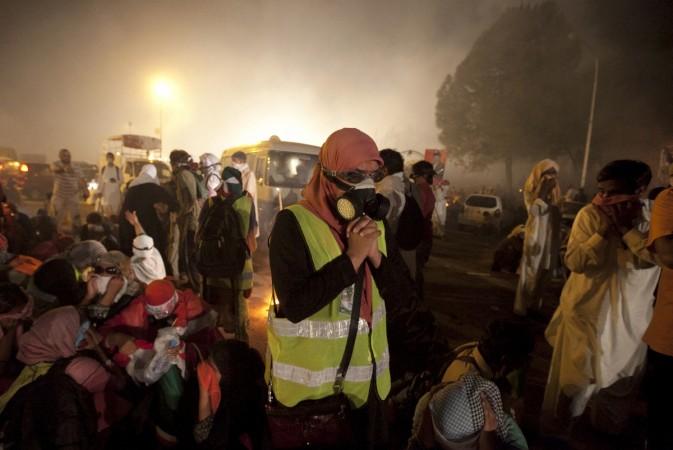
The Pakistan Army's role assumed more significance on Sunday after anti-government protests turned deadly, leaving at least three people dead and nearly 500 injured in clashes with the police.
While officials from the government-run hospital where hundreds of injured were admitted claimed that only three persons have died, the Opposition leaders say the toll is higher.
Reports cited Tahir ul-Qadri of the Paksitan Awami Tehreek (PAT) claiming that seven people from his party were killed after a brutal crackdown by the police while Imran Khan of the Pakistan Tehreek-e-Insaf said one member of his party was also killed.
The demonstrations took an ugly turn when protestors demanding Prime Minister Nawaz Sharif's resignation attempted to storm Sharif's residence by breaking police barricade, the Press Trust of India reported.
Army Chief General Raheel Sharif called for a crucial meeting of generals and corps commanders late on Sunday as violence continue between the protestors and security forces.
The army called for calm as the political crisis in Pakistan reached its deadliest 18th day, with an unequivocal warning that it was "committed to playing its part in ensuring security in the state."
"It was once again reiterated that the situation should be resolved politically without wasting any time and without recourse to violent means," a statement by the army's media unit said, according to the Express Tribune.
The massive protests in the capital began on 14 August, Pakistan's Independence Day, when Opposition leaders Imran Khan and Tahir ul-Qadri called for public protests against Sharif.
The former claims that the elections held last year that brought Sharif to power were rigged and is vehemently demanding re-elections.
Pakistan's capital fell into complete chaos over the weekend after protestors used force to break open gates to charge towards the prime minister's house, though reports suggested that Sharif has left his Islamabad residence to move to his home in Lahore. News about Sharif leaving the capital has further sparked speculations whether the government will fall any time soon.
The police resorted to lathicharge and teargas shelling to stop protestors causing injuries to many demonstrators as well as journalists.
One protester reportedly died of a heart attack after falling into a ditch, while two others admitted to the hospital died from injuries, according to Waseem Khawaja, a spokesman at the Pakistan Institute of Medical Sciences hospital, The New York Times reported.
Talks between the warring sides failed despite several attempts, forcing the Army to first step in to mediate between them on Friday.
The army is evidently assuming a stronger role as protests continue to threaten law and order in the besieged capital.









